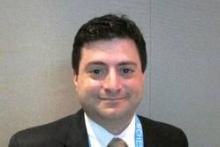AUSTIN, TEX. – An online, self-reported tool to determine risk of sleep disorders such as insomnia and restless legs syndrome outperformed assessment by a sleep specialist, new data show.
“Our results suggest that [the online survey] may be used in the primary care setting as a screening method for several sleep disorders,” Dr. Michael Morgenstern, a neurologist at the North Shore Long Island Jewish Medical Center, New Hyde Park, N.Y., said during an original investigation session at the annual meeting of the American College of Chest Physicians.
“The SNORE [Sleep Disorder and Narcolepsy Online Reference for Evaluation] online screening tool performs at least as well as the interviewer in detecting the risk of common sleep disorders, and at times it performs better,” Dr. Morgenstern said.
For obstructive sleep apnea and sleep disruption, the online screening tool and sleep physician interview were equal at assessing risk.
In a random, prospective, crossover trial of 53 adult sleep-clinic patients and 24 adult primary care–setting patients, two-thirds of whom were male, the SNORE self-report screening tool demonstrated both high sensitivity and high specificity for determining sleep disorder risks: between 94% and 85%, and 76% and 65%, respectively.
According to the American Academy of Sleep Medicine’s criteria for sleep disorder assessment, sleep specialists accurately determined the risk for insomnia 40.2% of the time, compared with SNORE’s 51.4%.
The online tool also bested a sleep specialist when it came to determining the risk of restless legs syndrome: The tool identified 44.1% of at-risk cases, while the specialist identified 23.3%.
Sleep specialists were slightly better than SNORE at determining patients at risk for sleep apnea: 78% for an interview with a specialist vs. 75.3% using the self-report tool.
Sleep disruption risk was determined equally by either method: 60% by a sleep specialist vs. 60% by SNORE.
Patients in the study were asked to complete the SNORE survey before they were interviewed by a sleep specialist. The sleep specialist was blinded to the patient’s history and survey results. Polysomnography was not included in the assessment, because risk assessment, not diagnosis, was the goal. A third of all participants were randomly assigned to take the SNORE test first or to be interviewed first.
The median overall time necessary to take the entire survey was 6 minutes. If a shortened version was used, the survey took an average of 4 minutes.
Using the survey in the primary care setting could lead to earlier detection and treatment of sleep disorders, Dr. Morgenstern noted, which would aid in overall health.
“For a lot of people who come to a primary care clinic, they don’t think to mention sleep-related symptoms, and the primary care doctor doesn’t really have time to ask about complaints the person isn’t there to talk about,” Dr. Morgenstern said. “But sleep is part of a person’s overall picture of health. Wouldn’t it be great if we had a way to identify issues so patients and providers could talk about it?”
Dr. Morgenstern said he had no relevant financial disclosures.
On Twitter @whitneymcknight


